It Was 40 Years ago Today
Music legend John Lennon's life was cut tragically short four decades ago.
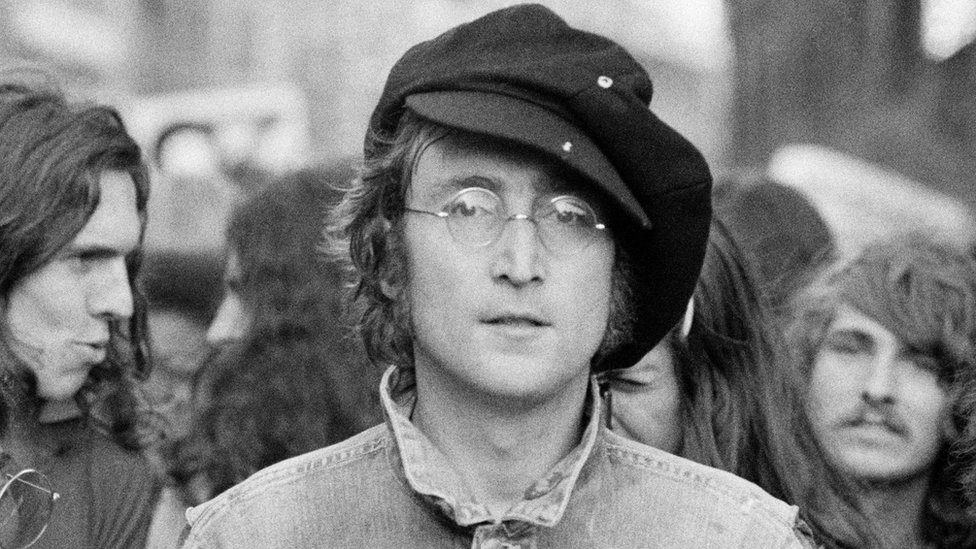
John Lennon, the famed Beatle who was having a solid solo career, was murdered outside his New York home forty years ago today. He was only 40, meaning he has now been gone almost as long as he was alive.
The New York Times covered it on the front page with the headline “John Lennon of Beatles Is Killed; Suspect Held in Shooting at Dakota.”
Inside, they had a feature by Robert Palmer titled “Lennon Known Both as Author and Composer.”
The Beatles united a generation of young people with their songs, their attitudes and their sense of style, and John Lennon was the thinking man’s Beatle.
Of the four, he was the Beatle who wrote books, the Beatle who embroiled the group in a potentially disastrous controversy by suggesting in an interview that they were more popular than Jesus, the Beatle who embraced the poetic innovations of Bob Dylan in the mid-1960’s and shocked Beatles fans by jumping into performance art, happenings and political protests in the late 60’s and early 70’s.
He was the Beatle who announced, in one of his first solo albums after the breakup of the Beatles, that “The Dream Is Over” – the dream of community through peace, love, mysticism and psychedelic drugs that the Beatles had encouraged and advertised.
And yet, paradoxically, Lennon never lost sight of that dream. “The media are saying that the 60’s were stupid and naive,” he remarked in an interview only a month ago. “But look at how much of what was sniggered about in the 60’s has become mainstream -health food, therapies and all the rest. And love and peace weren’t invented in the 60’s. What about Gandhi? What about Christ? The naivete is to buy the idea that the 60’s were naive.”
To protest Britain’s involvement in the Nigerian civil war and British support of the United States’ role in Vietnam, Lennon, named a Member of the Order of British Empire by Queen Elizabeth in 1965, returned his award. The award, the lowest of five divisions of the order, was presented to the four Beatles for service to their country.
[…]
Lennon and Paul McCartney were the group’s lead vocalists and songwriters, and as the Beatles grew more and more popular worldwide, their songs grew more complex. By the mid-60’s the Beatles were leaders of a worldwide rock movement that believed music with a beat could and should be intelligent and innovative as well.
The Beatles were the first popular rock and roll band to write their own material, to address a range of serious subjects and to embrace influences that ranged from Dylan’s folk poetry to Indian classical music to Karlheinz Stockhausen’s electronic sound collages. They changed the face of popular music, and popular culture, radically and irrevocably.
Beginning with the mid-60’s album “Rubber Soul,” the Lennon-McCartney songwriting partnership began to unravel. McCartney began concentrating on pure pop, contributing ballads like “Michelle” and “Eleanor Rigby.” Lennon wrote more complex songs, embodying the conflicts he was feeling acutely as a Beatle: between his private life as an intellectual and an artist and his public persona; between his role as a pop musician and a generational spokesman, and the unresolved personal problems of his childhood.
Out of this turmoil came exquisite songs of euphoria and confusion (“Strawberry Fields Forever” and “Lucy in the Sky with Diamonds”), some of the first and best examples of pop surrealism (“I Am The Walrus” and “Happiness Is A Warm Gun”), and electronic experiments that prefigured Lennon’s later collaborations with the conceptual artist Yoko Ono.
Lennon met Miss Ono in 1966 and by 1969, when they married, their romance was being blamed for the disintegration of the Beatles, who officially disbanded in 1970. The couple’s demystification of the Beatles began with their “Two Virgins” album, with its celebrated cover showing them nude, and continued with a series of albums that grafted Miss Ono’s experimental and sometimes intensely grating vocal techniques onto Lennon’s sensibility.
The music was dismissed by most critics and fans at the time, but it has been an important influence on some of the brightest talents in the most recent wave of rock performers.
His post-Beatles albums continued to mirror his internal struggles, particularly “John Lennon/Plastic Ono Band” (1970), which followed several months of “primal scream” therapy with Arthur Janov and included songs that attempted to exorcise childhood traumas. But Lennon was also, and perhaps first of all, one of the most tale nted pop tunesmiths of modern times, as he proved with the subsequent albums “Imagine” (1971) and “Mind Games” (1973).
In 1975, after recording an album of rock and roll oldies that he recently expressed some dissatisfaction with, Lennon stopped making records to concentrate on rearing the his and Yoko’s son, Sean, who is now 5 years old. ( Lennon also has a son, Julian, by his first wife, Cynthia).
In his own words, he was a “househusband,” tending to domestic duties while Miss Ono supervised the couple’s investments and other business matters.
Finally, in August, the Lennons began making a new album, “Double Fantasy,” which was released by Geffin Records last month and is now in the national top 20. Lennon’s first new single in five years, in the top 10, is optimistically titled “Starting Over.”
The album was conceived as a “dialogue on love,” with songs by Lennon alternating with songs by Miss Ono.
His colleague John Rockwell contributed another titled “Leader of a Rock Group That Helped Define a Generation.”
The Beatles were without any question the most popular, most influential of all rock groups, and John Lennon was the most impassioned, and probably the most deeply talented, of all the Beatles.
In 1964, when the Beatles first reached America to appear on the Ed Sullivan program, bemused adult observers found it difficult to distinguish them. They all seemed similarly gray-suited, mop-topped mannequins; what seized their attention was that their songs – “I Want to Hold Your Hand” was the archetype – celebrated teen love in a way that teenagers hadn’t responded to since the days of Elvis Presley and Frank Sinatra.
But soon thereafter, as the Beatles began to define their generation, it became apparent that Lennon and Paul McCartney were actually the creative forces behind the band. Ringo Starr was cute and cuddly and George Harrison played eloquent lead guitar and helped channel the Beatles’ energies into Eastern mysticsm. But it was Lennon and Paul McCartney who counted.
The two composed most the band’s songs and were the lead singers. At first they collaborated closely, sharing lyrics and music. Later they tended to compose separately, but for reasons of legality and personal loyalty the songs were still credited to both jointly.
TLennon and McCartney worked together in a classically complementary manner. McCartney was the sunny, bright one, the purveyor of lilting ballads and cheery love songs. Lennon was the harder, fiercer man, the true rocker of the foursome. He had the grittiest singing voice, and the deepest, most convoluted sense of rock’s anger and potential triumph.
The Beatles’ influence expressed itself first of all in the simple sociological dimensions of their success, unmatched in pop-music history to this day. But the band also managed almost singlehandedly to transform the innocent entertainment of rock-and-roll into the artistically self-conscious pretensions of rock. Lennon, with his eager willingness to explore the ramifications of the psychedelic experience, led that transformation more than any other Beatle.
But ironically, it was that very evolution away from the rude energy of early Beatles rock-and-roll that crystallized Lennon’s dilemma for the 70’s. He was once quoted as saying that the band had never made better, more intense music than it had in the cellar nightclubs of Hamburg in 1962. In the 70’s, he tried to find a way to recapture the power of this youth and to reconcile it with his adulthood, but he had severe difficulties in so doing.
I had just turned 15 at the time and only discovered Lennon and the Beatles the year before. The news hit me pretty hard.
His bandmate, Paul McCartney, tweeted this earlier today (thus reminding me of the anniversary):
Far and away his most famous solo hit:
The aforementioned hit from his final album:
My favorite song from said album:
Among my favorites from the Beatles period:
And, finally, a tribute by Sir Elton John:

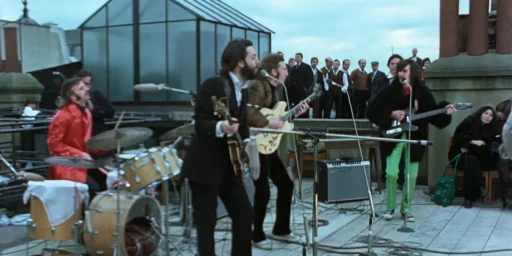
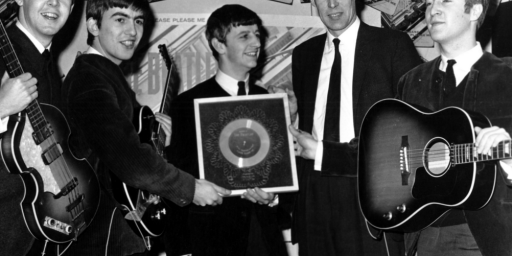
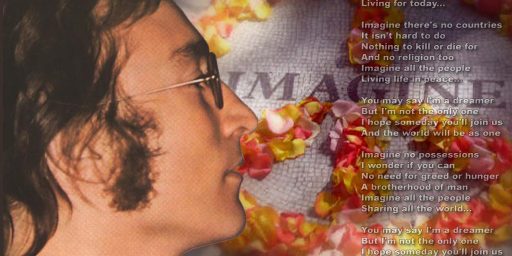

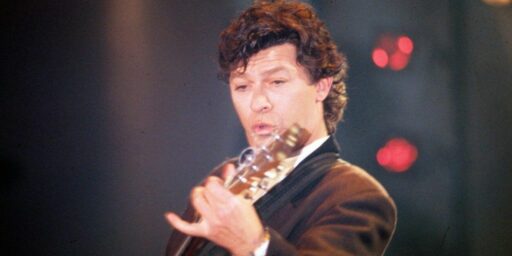
IIRC, both Lennon and McCartney lost their mothers at an early age. But I think Lennon also had an absentee father, which may have given his lyrics a harder edge.
I read an interview with McCartney in the NYT a few days ago. It’s quite touching. He names the funeral parlor they took Lennon’s body to, and describes going by there and saying, “Hi John!”.
@SC_Birdflyte:
Lennon wrote at least two songs about his mother. “Julia” and “Mother.” I don’t recall either well.
McCartney wrote one about his father, “When I’m 64.”
I had a brief Beatles kick around 1982. My older brother had all their records, and many solo albums as well. And I read one book about the band. BTW, the White Album was printed on white vinyl.
A thought: If John Lennon had lived he’d have been ‘canceled’ as a wife-beater and called out for ‘appropriating’ music from India.
I think the finest cover of Imagine was done by Herbie Hancock with India.Arie and others. It’s on YouTube
no heaven…
no hell…
no countries…
no religion…
only tears…
Trivia: Where was David Chapman just prior to murdering John Lennon? Answer: Watching David Bowie perform as the Elephant Man on Broadway.
I’m glad you mentioned “Watching the Wheels.” It happens to be my favorite post-Beatles song by an ex-Beatle–which is saying a lot because there are many I like, by all four of them. Lennon’s post-Beatles work is limited because of his 5-year hiatus and then his death, but what he did put out in that period was mostly amazing. McCartney has a much broader body of work, some of which is excellent, but it isn’t as consistent. This is despite the fact that Lennon had an important blind spot in how much he worked together with the basically talentless Yoko Ono.
@Michael Reynolds: I’ve heard several interviews with Julian Lennon, and it sounds like John wasn’t that great a father. Great artists/not great person. I am able to accept that. Julian had (and has) a good relationship with Paul henceHey, Jude.
@Slugger:
He was not a nice man. A huge talent, and also a bit of a prick. But for reasons I’ve explained many times, I am all about redemption. It’s even a major theme in a lot of my work.
One of the issues I have with cancel culture is how unevenly it’s applied, and how random the punishments. Lennon was a dick, so, would the world be a better place without Imagine? I have no issue with calling out bad behavior, but people who take it to the extent of demanding that ‘problematic’ artists be shoved down the memory hole are foolish and immature at best, and the moral equivalents of book burners at the extreme.
There’s some thinking that needs to be done about this issue. On the one hand, do I want to support assholes with my money? No. OTOH, do I want to deprive myself of the art created by assholes? No.
@Michael Reynolds:
Nicely put. Isaac Newton was apparently also not a nice guy, but we still use the physics (and the calculus he and Liebniz discovered). Though no doubt there’ll be a push to rename his equations soon (in which case I humbly offer the use off my name). We also still use the transistor based technology from William Schockley (another genius who wouldn’t pass today’s character standards). And the nitrogen fixing from the father of chemical warfare, Fritz Haber (his process feeds much of the world’s population). All of which leads me to believe that most of the cancelling is about empty symbolism, cancelling things that require no sacrifice.
The good John Lennon brought in his music isn’t tarnished (at least for me) by his flaws as a person (perhaps because I’m too aware I have my own).
Jesus had his faults too.
The only reason he walked on water is because he didn’t know how to swim.
@Northerner:
There’s a problem with bringing up science in this comparison. We could not substitute, say, F=ma, with some other value of F, just because Newton was trumpy. Force equals mass times acceleration regardless of who first discovered that particular mathematical relationship.
Technology is a bit different, as there are often multiple means of doing the same thing. the winner is usually the best combination of various trade-offs which include cost, reliability, waste, energy input, etc. We could use vacuum tubes instead of transistors, for example, but we would never be able to reduce them to a size that would allow for pocket radios, never mind the tiny computers we choose for some reason to call phones.
Music, and art in general, is somewhat subjective, and judged by values other than accuracy, cost, efficiency, energy, waste, etc.
When I heard that John Lennon had been shot and killed, I suspect my reaction was something along the lines of, “Huh. Didn’t see that coming.”
Michelangelo was a great artist. da Vinci was a great artist. Shakespeare was a great artist. Beethoven, Bach, and Mozart were great artists. John Lennon? Well, I have known and worked with a number of *artists.* Some of them were OK. A couple were good. Most were at best… Good on occasion. I think Lennon was good, not because I thought his music was good, but because so many others thought it was great. Personally, I just thought he was OK, enjoyable anyway. If people are still talking about him in 200 years, than yeah, maybe he was great, but only time will tell that tale.
**most people who think they are artists are just blowing smoke up their asses. I have a creative side, and while a few times I did manage to create things that I thought were deserving of the label of art, I never thought of myself as anything more than a craftsman.
@Kathy:
There’s also the fact that you often can’t totally separate art from moral issues, given how much of it is a commentary on the human condition. And that comes in degrees. One of the reasons Bill Cosby’s crimes got as much attention as they did, apart from the brutality and sheer number of them, is that he was held up as a moral paragon in our culture in a way that, say, Kevin Spacey was not.
Now, Lennon wasn’t a serial rapist, and he was never famous for being a mensch per se, so his failure to live up to that standard doesn’t have the same negative impact on his work as it does with Cosby. But it does affect how we view his work. For example, the song “Run for Your Life” sounds like something that could have been written by Jake LaMotta or O.J. Simpson, if they could speak in complete sentences. We could read it as a work of fiction by a songwriter who didn’t actually share the narrator’s feelings, if we didn’t know what we know of Lennon.
There’s the assumption that we have any reason to care about an artist’s private life. Why? And the assumption that ‘normal’ is actually normal and not just a self-soothing fantasy. Very few people have never committed a crime – but few of those admit it. Even fewer have never expressed a racist or misogynistic thought and you’d better not admit to that. Add in various other forms of exploitation, profiteering, weird fetishes etc… and you have what, 80% of the human race that could not withstand a deep Twitter vetting? And yet that 80% is part of the censorious masses.
We have hypocrites and the smugly delusional deciding who is and is not socially acceptable. And not content with blackballing current artists they reach back in time, denouncing the insufficiently woke of the 19th, 18th, 17th centuries. To what end? We deprive ourselves in order to virtue signal. That’s a choice made most easily by Philistines.
This is a system that rewards hypocrisy and ignorance, like all forms or puritanism, like all types of totalitarianism. It usually punishes deservedly bad people, but only usually. It also punishes people not for failing to be what they said they were, but for failing to be what you or I think they should be. Disappointing fans becomes a crime.
Artists are not the product, art is the product. Art is what you buy. That’s yours, that’s what the consumer has a right to. The artist is not a commodity. Is it sometimes hard to look past the artist and see only the art? Sure. But that’s a confusion in the mind of the consumer who has arrogated to themselves the right to judge the exposed artist from a position of safe obscurity.
I’m doing my part by listening to Prince tonight. I was in a mall in Waco TX when John Bonham died. Don’t remember where I was when Lennon died. Different times different generations.
@Kathy:
As you say, science tends to be unrelated to its discoverer (though apparently some think much of our science is patriarchal and western, and should be replaced by other types of science — Google for some interesting reads, though I note they never get around to saying just what would replace things like say Newton’s laws or the laws of thermodynamics). However that’s part of my point, it’d be a real sacrifice to stop using them, so the same people who want to cancel artists (at no personal sacrifice) haven’t suggested canceling scientists.
Technology on the other hand isn’t inherent in nature (or at least, not more than art is) — its human creativity. The only difference between say giving up transistor based computers for vacuum tube computers compared to giving up say Picasso’s work for some much nicer person’s work is that the sacrifice is much bigger in giving up transistors than in Picasso. Though come to think of it, the chances are that the people who developed vacuum tube technology were also sexist and racist by today’s standards, so we might have to go back to water based logical circuits rather than anything electrical.
While that’s true, accuracy, cost, efficiency, waste etc are all human value assessments — they’re also ultimately subjective. That is, they’re important because we think they’re important. So people not willing to give up say transistors for some crimes of the inventors while being willing to give up say some writer’s work for their crimes are playing symbolic games — they’re willing to sacrifice other people’s convenience (ie people who like that writer) but not their own.
@Kylopod: “One of the reasons Bill Cosby’s crimes got as much attention as they did, apart from the brutality and sheer number of them, is that he was held up as a moral paragon in our culture in a way that, say, Kevin Spacey was not.”
It wasn’t just that he was being held up as a moral paragon — it’s that he so loudly and insistently held himself up as a moral paragon.
@Kylopod: “We could read it as a work of fiction by a songwriter who didn’t actually share the narrator’s feelings, if we didn’t know what we know of Lennon.”
We know that Lennon hunted down and killed his ex-girlfriends?
You are free to think whatever you want about an artist and his art, but to simply assume that certain works are necessarily autobiographical and thus can only be viewed as a window into the artist’s true feelings seems mighty reductionist to me. And if we can jump to this assumption about Lennon, why can’t we also decide that any artwork reveals the true nature of the artist’s soul? Just because we’ve read enough about Lennon to decide he was a dick?
@wr:
What he insisted about himself would be irrelevant if the media and the show biz world had chosen to reject his self-characterization–which we know wasn’t the case.
No. We know Lennon beat his wives and girlfriends. We know he often became violently jealous. I wasn’t assuming anything based on the song. I was simply pointing out that the evidence from the real world suggests the lyrics, in his case, weren’t fiction. That was my entire point.
@Kylopod:
In part the confusion stems from the pabulum artists feed the public, all the self-aggrandizing crapola about their passion and their commitment and their authenticity. Inspiration! Opening a vein and bleeding onto the page! It came to me in a dream! I learned it at my grandmother’s feet! It’s my people’s history speaking through me! I am just a vessel!
And, did you negotiate for every last dollar before or after the divine inspiration transformed you into a vessel of truth?
The creation of art may or may not be passion, it may or may not be inspired by some profound emotional upwelling. But for the most part, it’s craft and marketing. It’s a job, a skill, a trick some people can perform well enough to be paid for it. I’ve written entire books, even book series, that had nothing to do with my heart, or inspiration, or passion but were just me figuring out a way to pay the rent. Or me just having a bit of fun. Or figuring out a way to make my vacations tax-deductible. Art is a product. ‘Artist’ is a job title. It’s something artists do because that’s their skill set and it pays the bills.
Whether you approve of the artist is really no more relevant than whether you approve of the people who sewed your sneakers.
@Michael Reynolds: Part of what fascinates me about Lennon is that he had those moments of brutal honesty and self-flagellation. Of course his “brutal honesty” was itself part of his stage-crafted image, and he could also be a massive liar (including the familiar practice of depicting himself as having working-class roots despite a privileged upbringing). In short, he was a bundle of contradictions. He’d troll the press, then he’d admit to trolling them. And yet there were moments where I sensed genuine honesty, passion, and depth–and I believe the growth and maturity you saw in the work he did shortly before his death was basically real, even if some of it was also an attempt to reinvent his image to stay relevant.
@Michael Reynolds: Oh, I don’t think the cancel culture cares much if you’re dead. You’re just lower priority.